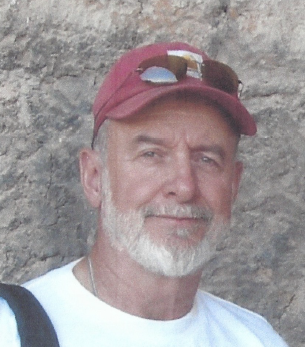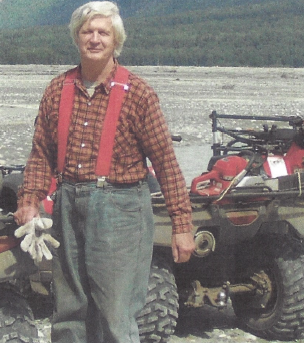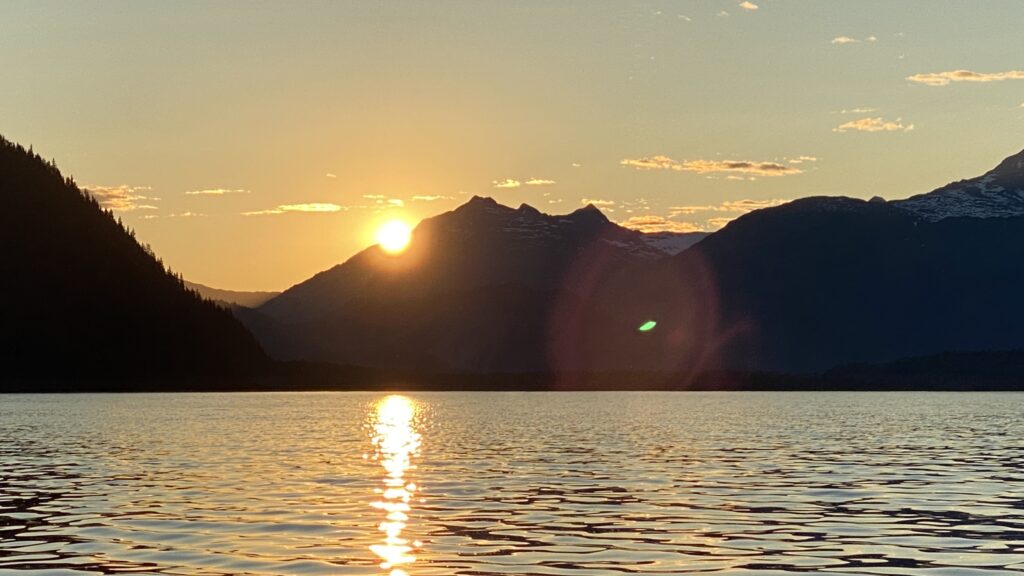Happy the man, and happy he alone,
He who can call today his own:
He who, secure within, can say,
Tomorrow do thy worst, for I have lived today.
Be fair or foul or rain or shine
The joys I have possessed, in spite of fate, are mine.
Not Heaven itself upon the past has power,
But what has been, has been, and I have had my hour.
John Dryden
July 2021 – I lived in a perpetual state of confusion. Is there still something wrong with my heart or is it me being some kind of a hypochondriac, where I imagine every little twinge and bit of heat in my chest, or down my arm is a sign of a problem? I worked hard at trying not to think about it, but one of my key activities to relax my mind – hiking – was also the physical test for whether chest pain might return.
I had a few days off from the go/no go hiking decision while we went to our cabin on a remote lake to attend a joint celebration of life for two different people we knew. The event had the potential to be emotionally difficult for me, having had my own near-miss with mortality so recently. But it was important for us to show up, to show our respect for these two unique and special people, and to offer our support to their loved ones. We flew to the lake under a cloudless, sunshine-filled sky in our bright yellow Piper on floats, taking in the snow-capped mountains, flowing rivers of ice, and seemingly endless forests that wrapped around the miles of salt-water Inside Passage below us. The scenery is never mundane, ever-changing, ever-evolving. It never gets old. I treasured the gift of my life, to still be able to witness such grandeur in the wild expanse of God’s creation.
Our friend Jon, who introduced us to the remote wilderness lake nearly twenty years earlier, died late in the evening the autumn before at the cabin that he and his wife Mary remodeled. Jon and Mary were long-time anchor residents of the lake. They represented a bridge generation between the families who built cabins and had since aged beyond the ability to access the lake and the newer, younger explorers, like ourselves, who embraced the inherent challenges of living in the remote, roadless environment. Jon, and Mary in particular, remembered all of the names and stories of the families that had at one point or another occupied the fifty or so cabins dotting the lake. They remembered the history and were witness to a time of robust social activity amongst the residents we jokingly referred to as “Peyton Place.”
Jon and Mary were seemingly inseparable, together nearly all of the time for a myriad of activities except when they reported to their individual offices in the same building back in town. They were like Yin and Yang, each bringing different skill sets and attributes to their marriage and joint projects, and incredibly industrious when they leveraged their combined skills. Like so many other lake residents, Jon and Mary spent their time off from work creating the quintessential Alaskan dream – constructing a simple but comfortable cabin and accessory buildings. Jon was a craftsman and embraced both the creative and practical aspects of the process. Mary brought her attention to detail and organizational skills to keep everything on track. Together, they practiced the fine art of cabin living, embracing the joys and mishaps of the adventure. As retirement grew closer, they started the building process anew on a different lot and constructed a larger cabin intended to be a year-round remote residence. They built the largest and most lovingly cared-for cabin on the lake, replete with special-purpose outbuildings, decks, and garden beds. They spent several years completing all of the finish work and refining their wilderness compound while embracing the wonder of each season on the lake. And then one summer evening, while entertaining friends, their cabin caught fire and burned to the ground. The fire became so hot that they could not stay on land, and were forced to retreat to their boats to seek safety in the middle of the lake. They were powerless to change the fate of their beloved cabin. There was no fire department to call. A lake full of water, but not a powerful enough pump or big enough hoses to douse the blaze. All they could do was sit and watch for hours as their dream home and everything in it was reduced to ashes.
Jon and Mary came to town and stayed with us within a few days of their cabin burning. I remember Jon joking that apparently, God thought he needed a new project, as he tried to explain his acceptance of the tragedy. He said he received many years of enjoyment from their cabin and could make peace with the fact that it was now gone. I recall being stunned by Jon’s response, but it represented his resilience in the face of calamity, and his greater value for the blessing of experiences over physical possessions. While many people would not have been able to reconcile the painful memories of that loss and place, Jon and Mary spent the next summer cleaning up the land where their cabin once stood. They debated about whether to take on another complete build or to buy a pre-existing cabin on the lake. They decided to make improvements to an existing structure, and over the next few summers, expanded and re-created a new, scaled-down version reminiscent of their prior cabin compound.
In early October 2020, Jon and Mary spent the evening socializing with a couple of cabin-builder friends, with no hint of what would happen next. Late in the evening, Jon stepped out on the back porch with the other men and collapsed from a heart attack, never regaining consciousness despite prolonged efforts of CPR to revive him. I can’t fully fathom the shock and reality that Mary had to reconcile that night. As a long-time Alaskan and remote cabin resident for many years, she understood the calculus for Jon’s likelihood of survival. She knew that emergency services are nonexistent in the remote parts of Alaska. Help could only arrive by boat or air since there are no roads to the lake. In the best of daylight and weather conditions, an emergency services team might be able to get there in about three hours. In the midst of her shock and disbelief at the events, she held out hope, yet Mary no doubt recognized that Jon was beyond the reach of any timely rescue. He was not coming back, and there was nothing anyone could do to change that. Jon was 72, seemingly healthy, full of life, and with plans for the future. And yet gone.

Harold, a self-admitted recluse and a curious character, prided himself on the very few times he felt the need to leave the lake to get supplies or for any other purpose in his many decades living there. He usually relied on people like Jon and Mary to help get his lengthy resupply list. Harold baked them pies, overwintered plants, and tended Mary’s garden beds while they traveled in return. Harold did not offer up his society easily. If you unintentionally interrupted a visit he was having with his small circle of trusted friends, he would disappear quickly. It took several years for Harold to accept our occasional presence for the afternoon social and cocktail hour at Jon and Mary’s, and even longer to have engaging conversations with him. He was generally anti-society and anti-government, but despite the remote location, was well-read, listened to the radio, and maintained a pulse on current events, facilitated by frequent deliveries of materials from people who engaged with society in his stead. In Harold’s former life, he had been a teacher, but he rarely spoke of his previous experience amongst the rest of civilization. He could talk at length about political issues and philosophy while enjoying his sense of being mostly unaffected by the outside world. He kept all but a selected few lake people at a distance and claimed not to suffer from loneliness over the long, snowbound, and isolated winters. Perhaps as a consequence, or by design, Harold’s death was unwitnessed. He knew it was coming. He made a rare trip to town to see a doctor after not feeling well and received news that his heart was not healthy. He declined further medical care, saying he didn’t want to die in a hospital. He preferred to die at the lake. And so he did, living and dying precisely as he pleased. Harold was 82.

The sun warmed the air into the mid-60s and a slight breeze rustled the boughs of the aged spruce trees that surrounded Harold’s cabin. A gathering of twenty or so people stood around in a roughly-defined circle in front of the low-roofed, piecemeal assembled cabin. It was a large gathering by lake standards and included relatives of Harold’s as well as friends and family of Jon’s and those that knew both of them. People stepped forward to share stories about Harold’s unique personality and his many years of life on the lake. The crowd then migrated by a back trail over to Jon and Mary’s remodeled log cabin, where we gathered around a fire pit, swatted at the ubiquitous mosquitoes, and shared a pot-luck barbecue. A large number of bottles of California champagne were found underneath Harold’s cabin, so glasses and solo cups were filled to relax tight throats as people shared memories of Jon. Mary, in her characteristic resiliency, did her best to maintain her composure as individuals recalled Jon’s generosity, kindness, and humor. She’d had almost a year to adjust to a new way of living, but it was a distinctively different existence without Jon.
I took in all of the sights and sounds of the remembrances. Both Jon and Harold would have been pleased with the uniquely Alaskan version of their celebrations. There were jet boats and float planes of visitors parked on the lake. Carhartt’s and Xtra-Tuffs mixed with fleece shirts and jackets were the attire of the day. There was no formality to any of it, yet it was as touching and heartfelt as any funeral held in a church. We stood in God’s sanctuary, surrounded by towering, ice-sculpted mountains and thick-trunked tall spruce, while an occasional eagle cry punctuated the light breeze coming off of the lake. There was laughter, there were tears, and moments when individuals stepped away to visit their grief in private. It was somber, yet joyous. Both men finished their lives in a place that they loved for years. This was the only place that could host a celebration of their lives.
In light of my recent heart attack, it was impossible for me not to imagine my own demise. This could just as easily have been a celebration of my life. My life could have timed out at 59, but by the grace of God, I am still here. I am grateful. Though Marty and I completed our wills and final requests several years ago, neither of us envisioned our passing any time soon. Now I realized perhaps I ought not to be so confident about the timing or circumstances of my own end, and it might be much sooner than I imagined. It could be a sudden, unexpected end to life as it had been for Jon, or a lingering shadow as I imagined it must have been for Harold, allowing time to contemplate it, fear it, or perhaps even welcome it.
I said nothing of my own heart attack to Mary or anyone else there. I didn’t want to redirect attention from the purpose of our gathering or to cause anyone worries about the risks I might be taking in being so far from help. Besides, my heart was supposed to be fixed. All indications were that the threat to my existence had passed. All I needed to do was focus on moving forward with my life, valuing every moment and blessing and person in it until such time as God calls me home. Lord, I’m not ready yet. There’s still so much I want to do, and people that need me to be here to support them.
As we rode across the lake later that evening to our own cabin, in an old skiff that once belonged to another lake friend who passed several years ago, we were treated to a glorious sun that turned the ripples of the water into a field of sparkling diamonds. As I marveled at the glacially-sculpted peaks rising abruptly over 5,000 feet above the lake elevation, I couldn’t imagine a heaven more beautiful than this one. God, let me stay in this heaven as long as I can, I prayed. I’m not ready to go yet.


What a wonderful tribute to your friends. Thanks for sharing!
Thank you for continuing to share your story. I look forward to each post and agree with Jane, what a beautifully written tribute to your friends. Time spent on the lake must be truly special.
Beautifully written. The way you have described these individuals, I know their identities and outstanding qualities will live on in the hearts of all who knew them.